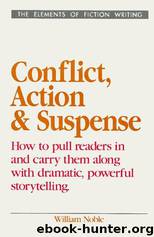Conflict, Action and Suspense by William Noble

Author:William Noble [Noble, William]
Language: eng
Format: epub
Published: 2011-03-21T07:00:00+00:00
Then, let's shift point of view:
Bobby couldn't believe the way Jamie just grinned at Fa-ther, as if this was one big joke. Didn't he understand how Father felt about the car? Jamie never appreciated. . . .
Here, we're not limited by what's in only one character's head. We have two points of view and two different reactions to the same facts, but the conflict remains no matter which way we turn. And so does the suspense because we don't know at this point what Father will do about the dent or whether any of the characters will own up. Until that happens, things remain uncertain.
Which is exactly where good suspense should put us.
CONVERGING THEMES
Two points of view or one . . . three points of view or two ... or one? Decisions that make us realize writing is work! We have to make a choice because the quality of our story could well depend on how we proceed. We have to think about whether a first-person singular point of view will hold the reader through several hundred pages of manuscript: Is the character strong for this, are we able to provide the complete story through the eyes of only one character? Perhaps we want to keep things intimate and burrow deeply into this single character's perceptions and experiences. Readers can be quick to identify with this approach because they want to be involved, and we're allowing them to put up a magnifying glass. Then, too, perhaps it's the kind of story where we feel more in control when a single point of view is followed. Matters do get complicated when we shift the point of view around, just like juggling two or three balls instead of tossing up only one.
We should make these point-of-view determinations while we're putting together our story outline. Who should tell the story, we ask ourselves, how many whos should there be? Is it the kind of story that develops in places and perceptions beyond the limited viewpoint of a single character? If so, we should move the point of view around.
An example: war stories such as Norman Mailer's The Naked and the Dead (Rinehart) or Philip Caputo's A Rumor of War (Holt, Rinehart and Winston) are noteworthy because they show the war's effects on a variety of people, and these effects wouldn't be so poignant if we only got a single character's point of view. By shifting viewpoints, the authors have broadened perspective and portrayed the intimate feelings of several characters. Ah, you're thinking, with first-person singular, others can relate how they feel to the person through whose eye the story is being told. True enough, but we aren't—can't be—inside the head of any other character, and this limits what the reader can perceive.
There are times, then, when we want to have multiple points of view through which we can develop quick-paced action and suspense along with a broadening story line. We know conflict can be easily portrayed with multiple points of view (think disagreement, think differences), and action and suspense can follow and build nicely.
Download
This site does not store any files on its server. We only index and link to content provided by other sites. Please contact the content providers to delete copyright contents if any and email us, we'll remove relevant links or contents immediately.
Asking the Right Questions: A Guide to Critical Thinking by M. Neil Browne & Stuart M. Keeley(5775)
Autoboyography by Christina Lauren(5235)
Eat That Frog! by Brian Tracy(4540)
Dialogue by Robert McKee(4404)
Sticky Fingers by Joe Hagan(4198)
Journeys Out of the Body by Robert Monroe(3624)
Annapurna by Maurice Herzog(3467)
Full Circle by Michael Palin(3450)
Schaum's Quick Guide to Writing Great Short Stories by Margaret Lucke(3381)
Elements of Style 2017 by Richard De A'Morelli(3350)
The Art of Dramatic Writing: Its Basis in the Creative Interpretation of Human Motives by Egri Lajos(3067)
Atlas Obscura by Joshua Foer(2962)
Why I Write by George Orwell(2954)
The Fight by Norman Mailer(2940)
The Diviners by Libba Bray(2938)
In Patagonia by Bruce Chatwin(2930)
The Mental Game of Writing: How to Overcome Obstacles, Stay Creative and Productive, and Free Your Mind for Success by James Scott Bell(2908)
Venice by Jan Morris(2573)
The Elements of Style by William Strunk and E. B. White(2473)
